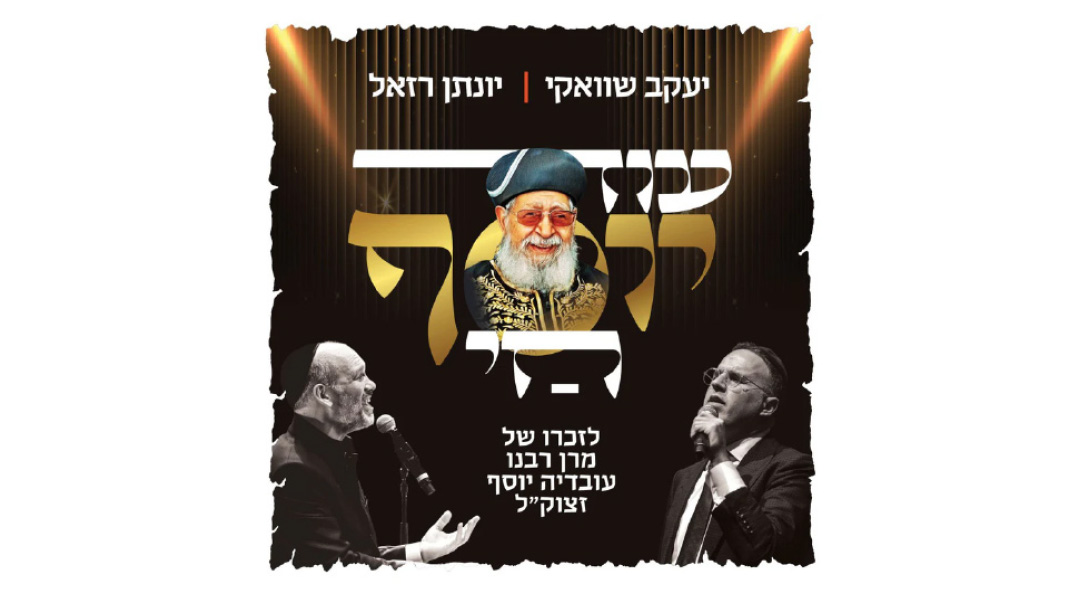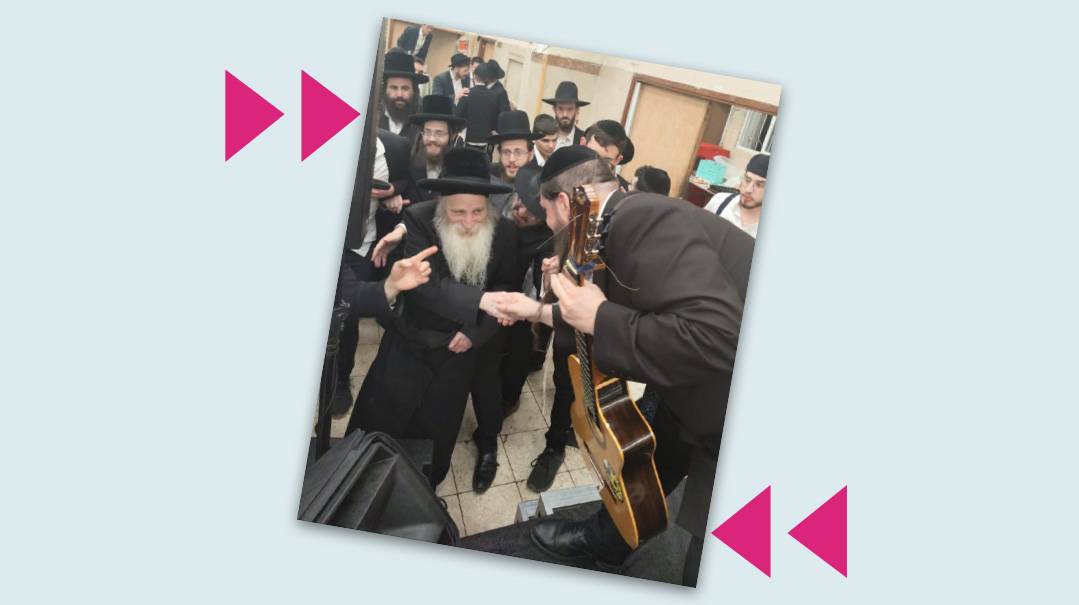Better and Better
| November 26, 2024Itzik Dadya’s Hebrew song “TAMID OHEV OTI” (That’s the catchy “Od yoter tov ve’od yoter tov, od yoter tov ve’od yoter tov”

Streamlined
Topping the charts over at 24Six is Itzik Dadya’s Hebrew song “TAMID OHEV OTI” (That’s the catchy “Od yoter tov ve’od yoter tov, od yoter tov ve’od yoter tov”) which injects a much-desired note of optimism into this challenging period. Itzik, a star Sephardic singer born and raised in the southern Israeli city of Netivot, has released several successful albums since his debut Am Yisrael Chai in 2010. His soothing vocals and expressive Hebrew lyrics are a winning combination.
Itzik shares the story behind this latest hit. “A friend and I went to the Kotel one Thursday night, where we ran into Rabbi Oren Levi. [Rabbi Levi, a survivor of the Beis Yisrael terror attack on Motzaei Shabbos in Adar 2002, is the father of Shimon, a popular Israeli singer who was a three-week old baby at the time and rescued from under a burning car. –Ed.] Rabbi Levi is one of the only people with a key to the cave of the kever of Shimon Hatzaddik, where he spreads Torah to all kinds of people who want to learn and grow. He took us there, and while we were there, he sang this song that he had composed together with Rav Shalom Arush and Breslov artist Yair Elitzur. I immediately connected with the song, but after returning to America, I completely forgot about it.
“One day I heard the song — Elitzur had released it for an Israeli audience. But it wasn’t until event planner and producer David Elefant called me a few days before Succot and told me that I had to bring this song to America, that I realized why it was so familiar — because I’d heard it that night at Kever Shimon Hatzaddik. Although it seemed impossible to produce a song this quickly, I decided to try, because of the special connection I felt to the song from its roots. With the amazing talent and dedication of the video production team, we managed to pull the project together in 48 hours.”
The song is hugely popular and has already spawned a Yiddish version with lyrics by Motty Ilowitz, sung by Levy Falkowitz, Yoeli Klein, and Shloimy Askal, plus a remix by Matt Dubb.
The unstoppable roll of Shmueli Ungar’s song “FIRE” has kept it up there in the top few songs played on 24Six, months after its release at the end of June. This month, another popular track was the moving “OD YOSEF CHAI,” sung by Yonatan Razel and Yaakov Shwekey. Composed in honor of the 11th yahrzeit of Rav Ovadia Yosef, the powerful lyrics describe his greatness in Torah, his love of all Jews, his strength of conviction, and the legacy of Torah and halachic rulings he left behind, while the chorus describes the love and praise both from his contemporaries Above and his disciples below: “Kedoshei elyon sharim le’umato, ashrei Yosef ashrei yoladeto… Ashrei mi sheba lekan vetalmudo beyado… Od Yosef chai, Od Yosef chai….”
“The song in memory of Rav Ovadia is a big zechut. It's a collaboration with Shuli Rand, who wrote the words. When I hear my voice accompanying the pictures of the Rav, who changed the Jewish world and effected a Torah revolution that affects our lives daily, it is just a gift and an honor for me,” says composer/singer Yonatan Razel. “It was a very happy reunion with my dear friend Yaakov Shwekey, and the feedback has been intense from so many who still long for Rav Ovadia with awe and love.”
Comeback Cantata
When Mona Rosenblum found an old treasure trove of Reb Benzion Shenker’s recordings in his storage space, he was excited. The cassettes contained Shenker songs that had never been released to the public, yet when Mona started to listen to them, the sound grated on his ears. Not because the niggunim were bad, but because the recordings were so outdated. They were made years ago with Bentzion Shenker singing into a mic, while Mona himself played piano accompaniment. For today’s discerning, sophisticated musical consumers, it would not be easy listening.
But Mona, concentrating on the melodies, realized that many of the tunes were gems, offering a timeless Yiddishe music feel. They just needed new arrangements to bring out their beauty, with up-to-date recording technology. And so he selected a short list and began to work on arrangements, using a full seventy-piece orchestra. Some listeners have described them as “the richest arrangements Mona has written in 25 years.”
Finding singers was not difficult, as several vocalists wanted to be part of this project, and the final choices were Yidi Bialostozky, Eli Marcus, Avremi Roth, and young Bentzion Kletzkin, who offer a variety of ranges and singing styles.
Some of the songs chosen for ShIRASA — Beloved Melodies Brought Back to Life include “Mizmor L’Dovid,” which Reb Bentzion composed and recorded solo forty years ago, and the highlight “Mimkomcha,” which Reb Bentzion would sing with a chaburah but that never really spread. Feedback has been strong, and the Shirasa production crew at YRA Productions welcome suggestions for more old-style, little-known songs which deserve to make an up-to-date comeback on future volumes, bringing the beauty of traditional music styles, with their purity and taam, to today's audiences.
Story Behind the Song
It’s All for the Best
“The title track on my album Hakol Mishamayim went through many transformations as we were building it,” says Mordechai Shapiro. “I actually composed the song, and lyrics were written by Miriam Israeli and Chayale Neuhuas. I was recording the song at Doni Gross’s studio one afternoon, but although it was already at that late stage, I just wasn’t connecting to the melody of the chorus.”
After hours of recording, Mordy told Doni to mute his vocals in the chorus, and Mordechai rewrote a new chorus on the spot, which ended up being the final melody.
“My producer, Yitzy Waldner, was laughing at me because he knows that I do these kinds of changes a little too often, but he loved the new melody as well,” Mordy says. “The song ‘Hakol Mishamayim’ has actually made a huge impact on my life in ways I never could have imagined back then. The message of the song is so strong — how we wake up every day and have a plan of action, but Hashem ultimately runs the show, and we must realize that everything He does is for our absolute best, even if we don’t understand. All of my songs are message-driven, but this song in particular was very powerful for me. I find myself constantly humming the words ‘Hakol Mishamayim’ as I go through my own challenging moments.”
Mic Drop
We Grew Together
“I was around 17 when I first appeared on Jewish music radio. There were a few popular stations back then, and I liked music and was a bit of a singer, and soon I found myself making my own music programs,” recalls producer SHALOM WAGSHAL. “Through those programs, I built up some connections in the music world. I married when I was almost 20, and after that took some further steps into the industry. I started out working as a wedding singer, but realized that as a singer, I’d never become top-flight, and I could do more as a producer. I looked around and saw that although the band leaders were frum, the musicians at frum weddings were generally not. Very few chareidi Jews could even read sheet music. With a partner, Moishy Roth, I opened the Hamenagnim Orchestra. We insisted on using sheet music at rehearsals and jobs, which was originally tough for our musicians. But it was the right way to go, we grew in to it together, and today frum wedding musicians are almost a given.”
(Originally featured in Mishpacha, Issue 1038)
Oops! We could not locate your form.






